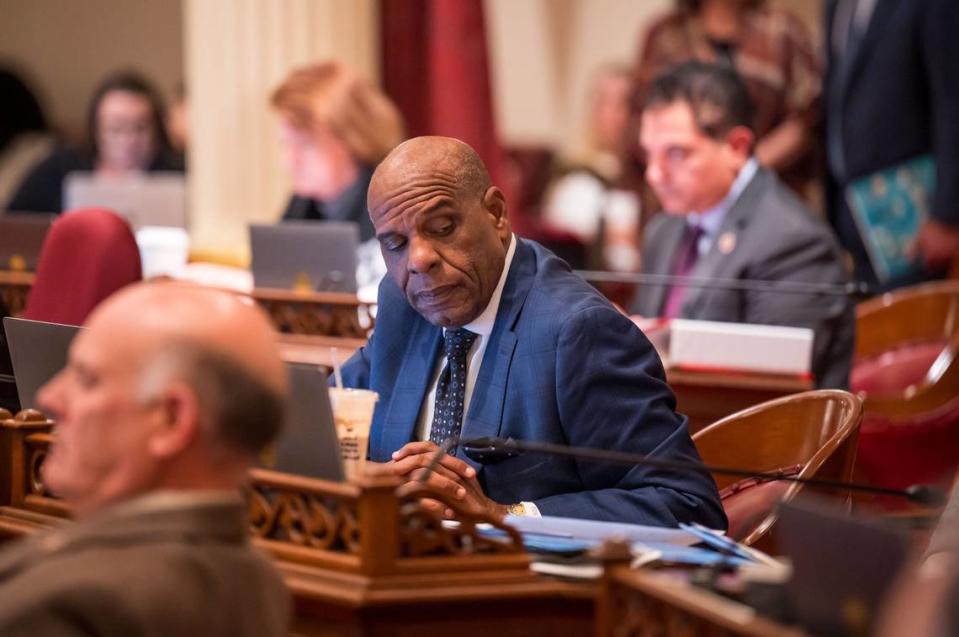California lawmakers shelve 2 criminal justice reform bills at last minute. What went wrong?
- Oops!Something went wrong.Please try again later.
- Oops!Something went wrong.Please try again later.
Bills aimed at overhauling two California criminal justice issues fell apart during the last hours of the legislative year, showing the challenges such measures face, even in a deep-blue state.
Senate Bill 50, authored by Sen. Steven Bradford, D-Gardena, would have limited when police officers can conduct traffic stops in an effort to reduce racial profiling. Senate Bill 94 from Sen. Dave Cortese, D-San Jose, would have allowed some prisoners serving life without parole to petition courts for re-sentencing.

“California is not as progressive as we want the rest of the world or the rest of the country to believe,” Bradford said. “We tend to continue to lean toward law enforcement and the lock-them-up attitude than real police reform and criminal justice reform that this country and this state truly needs.”
The lawmakers pulled their bills late Thursday night after months of opposition from influential district attorneys and law enforcement groups. Bradford and Cortese have both previously authored similar bills that did not make it through the Capitol.
Cortese and Bradford both said they plan to make their bills two-year measures, meaning they will bring them back next year for another try. When asked what he thought about the fate of the two bills, Cortese said voter concerns about crime and the perceived lack of penalties for those who commit them, especially in purple districts, bleed into lawmakers’ votes.
“Believe it or not, it’s almost as if certain members — especially in the other house — they’ll tell you, ‘I can only vote on one of one of these, I can’t vote on both of these,’” the senator said. “’I’m willing to go back to my district and explain that I voted for one significant criminal justice bill, but I want to be able to say I voted no on the other one.’”
Decreasing racial profiling stops
SB 50 would have prohibited officers from pulling over people in vehicles and bicycles for low-level offenses, unless multiple offenses were seen or a separate reason for a stop exists. The goal was to decrease illegitimate stops and investigations, commonly referred to as pretextual stops.
“We made a great case for why people shouldn’t be stopped by these irrelevant police stops and, unfortunately, members of the Assembly didn’t see it the same way,” Bradford said.
The low-level offenses included in the bill were related to vehicle registration, license plates, lighting, window tinting, bumpers or bike equipment. It did not include violations to commercial vehicles and would have allowed police to send a citation or warning letter through the mail in lieu of stops.
Last year, a similar bill died much earlier in the legislative process.
In January, a state board found that Californians perceived as Black by officers were 2.2 times more likely to be searched and have force used against them than people identified as white. For those perceived as Latino, officers used force at 1.3 times the rate of individuals perceived as white.
The report was based on a review of 3.1 million vehicle and pedestrian stops in 2021.
“It would make all Californians, as well as law enforcement, safer when you can avoid, many of the time, irrelevant, non-safety minor violations that create situations where people are not only harassed, arrested, but unfortunately also lose their lives.” Bradford said.
But influential law enforcement groups, including the California State Sheriffs’ Association and California District Attorneys Association, heavily opposed the bill. They argued the legislation would deprive officers of an investigative tool, jeopardize public safety and reduce accountability for low-level infractions.
Re-sentencing for aging prisoners
SB 94 would have allowed prisoners serving life without parole for crimes committed before June 5, 1990, to ask judges to re-sentence them to 25 years to life with parole.
Eligible inmates would have needed to serve at least 25 years in prison. Those who killed three or more people, who committed certain sexual crimes together with murder or who killed police officers would not be able to seek re-sentencing.
“Nothing’s ever foolproof, but it’s narrowed much as it possibly could be,” Cortese said. “And we trust the governors to do commutations in one step. This bill created, in effect, four steps that people have to go through. ... It’s hard to believe that a whole series of mistakes would be made by all those entities.”

Criminal justice reform organizations supporting the bill say some inmates will die in prison for crimes that would receive lighter sentences today.
But opponents said SB 94 would open the door to parole for inmates convicted of violent crimes and would break promises to victims who believed perpetrators would never get out of prison.
Cortese said he ultimately was not sure enough about the Assembly members’ positions on SB 94 to move forward with a vote, and Speaker Robert Rivas, D-Hollister, had some concerns about the measure.
“On a bill like that, when the stakes are high, you don’t want to go in there without knowing the final count,” he said.

